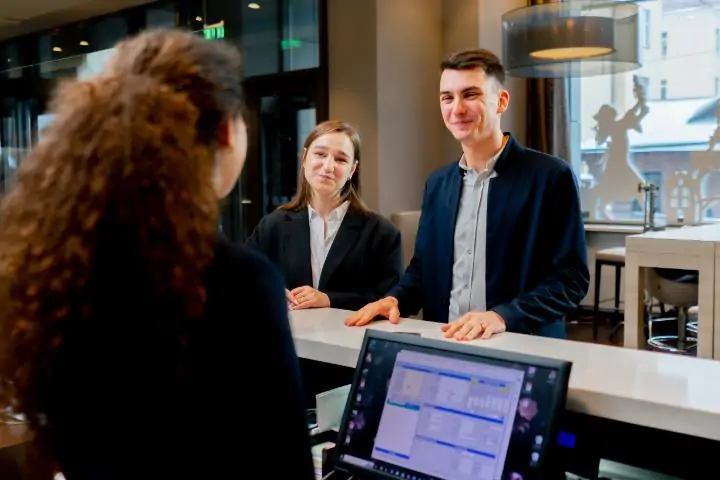
Technology-First Hospitality in 2025
Table of Contents
ToggleIn 2025, technology is reshaping how hotels interact with and cater to their guests.
Travelers increasingly value seamless and tech-driven experiences, prompting hotels to adopt cutting-edge innovations that redefine hospitality.
By leveraging technology, hotels are improving efficiency, enhancing personalization, and meeting the modern guest’s expectations for convenience.
Virtual Concierges
Virtual concierges are becoming a central feature in hotels worldwide. Powered by artificial intelligence, these digital assistants are accessible via mobile apps, in-room devices, or hotel websites. They offer 24/7 support for tasks such as:
- Answering queries: Providing instant responses about hotel amenities, local attractions, and more.
- Making reservations: Assisting guests with booking restaurants, spa appointments, or transportation.
- Providing recommendations: Offering tailored suggestions for dining, activities, or events based on guest preferences.
This technology not only streamlines communication but also reduces the need for in-person interactions, catering to guests who prioritize efficiency and privacy.
Mobile Check-Ins
The traditional check-in process is being revolutionized by mobile technology. Guests can bypass reception desks entirely by checking in via their smartphones.
Benefits of mobile check-ins include:
- Time savings: Guests can complete the process in advance or upon arrival without waiting in line.
- Personalization: Travelers can select their preferred room type, floor, or view directly through the app.
- Contactless convenience: Especially relevant in the post-pandemic era, mobile check-ins reduce physical contact, enhancing safety.
Mobile check-ins also streamline the check-out process, allowing guests to settle bills and receive digital receipts through their devices.
Dedicated Hotel Apps
Hotel-specific mobile apps have emerged as powerful tools for delivering personalized and integrated services. These apps provide guests with a centralized platform to manage all aspects of their stay, including:
- Room service: Guests can browse menus, place orders, and even schedule meal deliveries at their convenience.
- Smart room controls: Adjust lighting, temperature, and entertainment options directly from the app.
- Activity planning: Book excursions, spa treatments, or guided tours with a few taps.
Some hotel apps also include loyalty program integrations, allowing guests to track and redeem rewards seamlessly.
Enhanced Connectivity
Fast and reliable internet access is a non-negotiable requirement for modern travelers. Hotels are upgrading their infrastructure to ensure high-speed Wi-Fi across all areas, from guest rooms to lobbies and outdoor spaces.
Advanced connectivity supports:
- Streaming entertainment: Enabling guests to use platforms like Netflix, Hulu, or YouTube in their rooms.
- Remote work: Providing the bandwidth needed for video conferencing, large file transfers, and other business activities.
- Smart technologies: Powering Internet of Things (IoT) devices, such as smart locks, thermostats, and voice-activated assistants.
Augmented and Virtual Reality (AR/VR)
Augmented and virtual reality are elevating guest experiences to new heights. Applications include:
- Virtual tours: Allowing potential guests to explore rooms, amenities, and event spaces before booking.
- In-room entertainment: Offering immersive experiences, such as virtual travel or gaming.
- Event planning: Helping organizers visualize setups for weddings, conferences, or banquets.
These innovations appeal to tech-savvy guests seeking interactive and engaging services.
Seamless Integrations
Technology-first hospitality also emphasizes integrating systems for a cohesive guest experience. For example:
- Unified profiles: Guests’ preferences and past stays are stored in a centralized system, enabling hotels to anticipate needs and offer tailored services.
- Real-time updates: Notifications about room readiness, dining promotions, or activity schedules are sent directly to guests’ devices.
- Multilingual support: Technology bridges language barriers, with apps and virtual concierges offering services in multiple languages.
